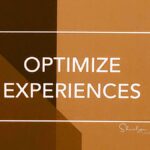Estimated reading time: 7 minutes
Where would your organization be in a month if everyone focused on improving every single week? It’s a big question to consider. And right now is a perfect time to focus on improvement as organizations think about their post-pandemic business and talent strategies.
I’ve been hearing about the term people science for a while and wanted to learn more about how people science can help managers and employees improve – not just once but on a continuous basis. So I reached out to Jessie Wisdom, PhD, co-founder and head of people science at Humu, an HR software platform that makes it easy for organizations to improve, every single week.. Prior to Humu, Dr. Wisdom led projects for Google’s People Innovation Lab.
Jessie, thanks so much for being here. I’m very intrigued by the term “people science”. Can you briefly explain what people science is and why organizations should pay attention to it?
[Wisdom] People Science is a people-focused approach that brings academic rigor to the study and practice of happiness and success at work. It combines insights and methodologies from the fields of behavioral economics, industrial-organizational psychology, organizational development, and data science.
It’s also often referred to as ‘people analytics’, which was created by the people operations team at Google under Laszlo Bock, one of my co-founders at Humu.
Organizations should pay attention to people science because it can help them create more equitable and healthy work environments. Humans are very susceptible to bias, which means that gut-based talent decisions often lead to inequities.
A particular challenge with a lot of HR issues and people challenges inside companies is every single person has their own intuition about what the right answer is. Unless you actually run the experiments and work in the field, whose opinion is more valid than anyone else’s? That’s where people science can help.
When individuals think about science, they might initially envision “hard” science like physics and chemistry. But I saw a quote from you that mentioned “Technology can do a lot of things, but it can’t feel.” What’s the connection between people science and feelings like empathy?
[Wisdom] People science can help leaders, managers, and individuals figure out how to best create a work environment in which each person feels valued, heard, and empowered to succeed.
One example of how people science does this is by leveraging nudges, or short, science-backed suggestions that prompt people to make better decisions. For example, a manager with great intentions might be so busy and focused on completing important tasks that they forget to check in with their reports at the beginning of 1:1s. A simple nudge before a 1:1 that reminds them to lead with empathy by asking something like, ‘How are you?’ or ‘What can I do to better support you?’ can have a big impact on how that report feels–and then on their performance and willingness to stay at the organization.
At Humu, we’ve built a software platform that integrates a range of data including employee engagement survey responses and individuals’ preferences to pick the exact right nudge to send a specific person at the right time. But what I said is true: technology can’t feel. That’s why I assembled a team that includes organizational psychologists and cognitive neuroscientists. When we make product decisions, we make sure that the whole team is considering the complexity of what it really feels like to be a person at work on any given day.
I’ve been seeing an increase in articles that make a connection between empathy and diversity, equity, inclusion, and belonging (DEIB). If people science and empathy are connected, then is people science connected to DEIB? Why or why not?
[Wisdom] Absolutely. People science can help organizations rely on data-driven decision-making, which (isn’t perfect but) tends to be less biased than going with your gut instinct.
For example, a people scientist might examine the data from the organization to understand whether different groups of people are feeling differently, or have different organizational outcomes, like performance scores, promotion rates, or compensation. They might also help to design future organizational practices or systems based on what we know from previous research on how to create inclusive environments, reduce bias in hiring, etc.
Organizations are currently evaluating their options where remote and hybrid work are concerned. Can people science help organizations make good decisions where their work environment is concerned? Maybe you could offer an example?
[Wisdom] Absolutely, but I want to first make sure leaders don’t jump to the wrong conclusions from the data they’re gathering now. People science can help them think more carefully about what might be driving noticeable trends. For example, if you observe that women at your company are more likely to say they want to work from home, ask why. Get curious about it. Try to find new ways to understand things, accommodate the needs of different people, and think hard about the potential unintended consequences of your policies.
Beyond looking at their own internal data to understand the experiences and outcomes for people who are remote versus co-located, organizations can and should establish best practices from organizational psychology research.
As just one example, managers may be (unintentionally) biased towards people they are co-located with, giving them more opportunities or higher performance ratings. By creating a clear focus on outcomes (not simply observable proxies of performance like time in the office) and reinforcing that focus via structured performance reviews or task assignment processes, we can help managers to make more fair and unbiased decisions. A simple change, like a manager looking at a list of all the people on their team who could be considered for a project, versus choosing whoever comes to their mind first – making remote team members more salient for consideration – can lead to significant changes.
Last question. All the things we’re talking about involve management – people, empathy, DEIB, and hybrid work. How can organizations bring managers into the people science conversation?
[Wisdom] People science can clarify for managers what small actions they can take to have a big impact on how their teams feel and perform. Modern managers are overwhelmed. In Humu’s 2022 State of the Manager Report, our data shows they’re struggling to help their people combat burnout and to hold onto top talent. Those can feel like big, overwhelming challenges. But with people science, organizations can help managers pinpoint exactly what they can do to make a difference. For example, a manager who learns their team is feeling unrecognized can kick off team meetings by acknowledging the efforts of their team or make it more of a priority to give positive feedback during 1:1s.
We’ve also seen how important managers are as catalysts for change within an organization. When employees see their managers trying to make things better (whether it’s working on creating a more inclusive environment, or better explaining decisions that are made, or setting more clear goals for their team), it goes a long way.
A huge thanks to Dr. Jessie Wisdom for sharing her expertise with us. If you want to learn more about people science, be sure to download Humu’s 2022 State of the Manager Report mentioned above. One of the most telling results for me was that almost half (47%) of managers said that they struggle with giving feedback, coaching, and career development. Not what you want to hear when employees are quitting at record numbers.
Organizations have a real opportunity to strengthen their workforce and improve their business as a result. But as Dr. Wisdom mentioned, it takes investing in your management team. They need the tools and support to hire, engage, and retain the best people. Part of those tools and support is explaining the science behind making optimal employee decisions.
22







